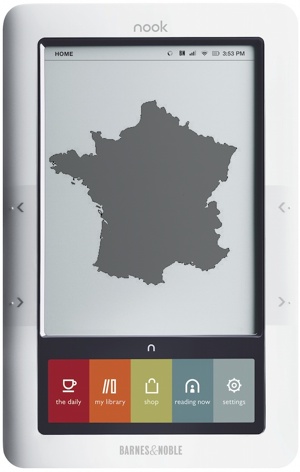 Like them or not, e-books are here to stay. Personally, I don’t like them — but that’s mainly because e-book readers have been ugly, clumsy, and limited in function and selection. The tidal wave of readers we saw at CES, however, suggests that even die-hard curmudgeons like myself may soon be among the faithful. What this means, of course, is that e-books, while a real business already, are going to be looking at serious growth over the next two years. And since that necessarily will impact negatively the sales of real ink-on-paper books, retailers are looking for a way to ride the e-book wave.
Like them or not, e-books are here to stay. Personally, I don’t like them — but that’s mainly because e-book readers have been ugly, clumsy, and limited in function and selection. The tidal wave of readers we saw at CES, however, suggests that even die-hard curmudgeons like myself may soon be among the faithful. What this means, of course, is that e-books, while a real business already, are going to be looking at serious growth over the next two years. And since that necessarily will impact negatively the sales of real ink-on-paper books, retailers are looking for a way to ride the e-book wave.
Let them E-cake
French retailers, like most in the world, are in an awkward position. They know how widely-available, easy-to-download, easy-to-steal e-books on popular, cheap devices will affect their business: in five to eight years they’ll be begging for scraps from Google and Amazon. So they’ve gone arm-in-arm to see the wizard, in hopes that France will set up some sort of national e-book “hub,” by which I suppose they mean website or software. They’ve all already got something or other in place, but they think the only way to stand against the big bad Google is to join forces.
There would be protections in place for pricing, which would be lower with the French retailers working together, and the single-point service would be helpful to consumers. And although it’s doubtful that anyone trusts a major retail chain that much more than Amazon.fr, there is something to be said for keeping familiar brands alive.
There’s something noble in this scramble for self-preservation, like an antelope kicking a lioness in the jaw, but it seems to me that it’s too late: the pride is closing in. The fact is that Amazon and Google hold all the power in this relationship — them and the publishers, who have no sympathy for retailers who have likely been trying to gouge them for years. Why should the publishers give a hand? Pour La France? These are book chains owned by multinational corporations, not mom-and-pop corner book stores scraping by. No, the publishers must look to their own survival and profit, and for e-books, Google and Amazon are the 500-pound gorillas they need to appease.
The rhetoric being employed attempts to cast the retailers as the little guy. Says Guillaume Decitre, head of retailer Decitre:
If we don’t manage to do this, what’s going to happen? We will find ourselves in front of a platform, or hub, already made by a private company … whether Amazon, Google or Apple.
It’s unclear what they propose as an actual benefit to having a French hub run by them, other than a stay of execution for the retailers involved. An analyst makes noises about “preserving the culture,” but how much culture do you feel the US lost when Circuit City closed? Brick and mortars were our biggest loser of the decade for a reason. Smart ones, like Barnes and Noble, have ensured a position in the new e-book world order by creating powerful, unique IP that they can wield like a club. Want to put your books on our sweet nook? Well, let’s talk turkey. But these French retailers saw the writing on the wall too late and now all they can do is beg and hope for more scandals like 1984 to put off the inevitable.
As the publishers and analysts note, however, it seems unlikely that everyone is going to set aside their differences and put something together. There are just too many conflicting interests involved, and at any rate none of these monster businesses could launch a product fast enough to deal with the steadily advancing Amazons and Google of the world.
I feel sorry for them, and I appreciate them not taking out their looming obsolescence on the consumers, but that isn’t going to change the fact that their business model is simply out of date. Megastores like Virgin’s and the others are dinosaurs, and they shouldn’t be surprised when they start going extinct.